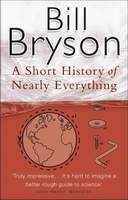EXCITING HISTORY (16 november 2006)
I always used to be somewhat surprised at people who wanted to re-read a book they had just finished reading.
But now it happened to me ...
The book I just read and want to read again is A Short History of Nearly Everything, written by Bill Bryson.

In thirty chapters, Mr Bryson describes the origins of the cosmos, of our earth and of life itself. In the process, he also deals with such diverse subjects as the theory of relativity, the dimensions of the universe, the extinction of thousands of species of plants and animals and a host of other subjects.
I have often heard people complain that science could be quite interesting, but the way it's taught at school is far from exciting. If this was your experience too, then Bryson's book is what you should read!
Mr Bryson's book not only reads like an exciting novel, we also learn quite a few interesting facts.
For instance, did you ever hear about Thomas Midgley? Midgley is reponsible for two ill-begotten inventions: the leading of petrol, which caused huge quantities of poionous lead to enter into the environment. And secondly: CFC, the substance used in refrigerators which was found to cause enormous damage to the ozone layer and was consequently banned about a decade ago.
Not only is the book highly informative, Mr Bryson also has a great sense of humour, for instance he doesn't just say "there are very few experts on a genus called bdelloid rotifer". Instead, we read: "you could have all the bdelloid rotifer experts in the world to dinner and not have to borrow plates from the neighbours."
Another interesting fact: unless you were born from a virgin, you have two parents, don't you? And if you go back two generations, you'll hit upon four ancestors. But what if you go back thirty generations? The answer given in the book is: approximately one billion ancestors, or to be exact: 1,073,741,824, more than the world's population at the time, so some ancestors must have been counted more than once.
We know about Newton's Law of Gravity , don't we? But did anybody tell you what kind of man Newton was and under what circumstances he made his discovery? All this -- and a lot more -- can be read in Bryson's great book.
If I had to quote every interesting passage in the book, I would get into trouble with the publisher since I would have to quote almost the entire book. But just one last quote: "there are three stages in scientific discovery: first, people deny that it is true; then they deny that it is important, finally they credit the wrong person." A discouraging idea for promising young scientists!
No need to mention it's a book I highly recommend!